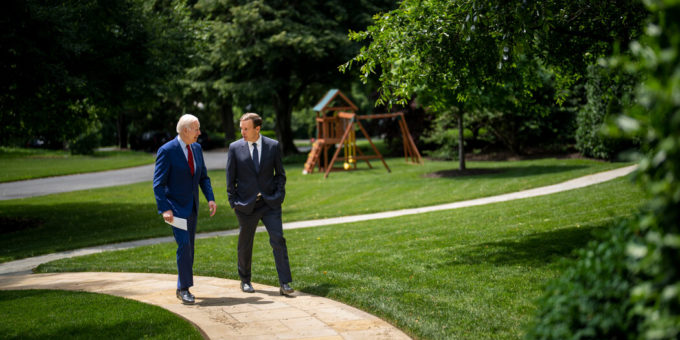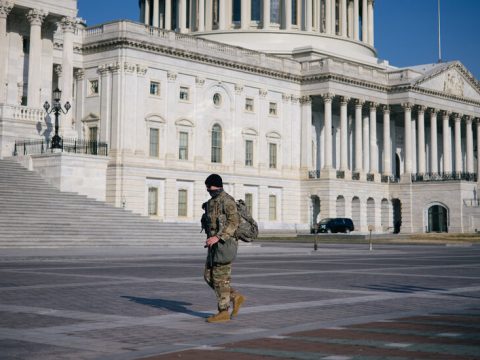
WASHINGTON — The bipartisan gun safety deal announced Sunday is far from what Democrats would have preferred in the aftermath of the racist gun massacre in Buffalo and the mass shooting at an elementary school in Uvalde, Texas, but it is considerably more than they hoped for initially.
The proposal, which still has a long way to go before becoming law, focuses less on the “gun” part of gun control and more on other factors, such as a buyer’s mental health or violent tendencies, in a concession to Republican hesitation and the hard political reality that tough limits on sales, let alone outright bans on firearms, are far out of reach.
Though it would not raise the age to buy assault rifles from 18 to 21, the plan would enhance background checks on those under 21 before they could take possession of a gun — perhaps the most significant element of the emerging measure. Republicans say enough sentiment exists for a direct age increase, but perhaps not enough to forestall a filibuster.
Democrats would much rather ban assault weapons and high-capacity magazines, impose universal background checks and take other stringent steps to limit access to guns. But they will accept the agreement as a step in the right direction.
“We cannot let the congressional perfect be the enemy of the good,” said Senator Richard J. Durbin of Illinois, the No. 2 Senate Democrat, who said he would have preferred to bar military assault weapons. “Though this agreement falls short in this and other respects, it can and will make our nation safer.”
In interviews over the past two weeks, multiple Senate Democrats made it clear they were ready to embrace almost anything the bipartisan talks could produce, rather than engage in another fruitless standoff on the Senate floor and ending up with nothing.
That outcome might have allowed them to make a potent political point, pummeling Republicans for standing in the way of popular gun control initiatives, but it would not have answered the public outcry for action. Stymied on multiple legislative fronts, Democrats are also eager to claim a win for a change.
“While more is needed, this package will take steps to save lives,” Speaker Nancy Pelosi said Sunday in a statement, indicating she will back it even though the House last week passed much more sweeping measures.
As the talks got underway two weeks ago, it appeared more likely that the effort would collapse, as so many had before it, once the initial outrage of the most recent mass shootings had died down. And the designation of Senator John Cornyn of Texas as the lead Republican negotiator limited the possibilities from the start, since Mr. Cornyn quickly declared that he would not be backing an assault weapons ban or other steps to make weapons harder to obtain.
But as the talks continued, Senator Christopher S. Murphy of Connecticut, the lead Democratic negotiator, said steady progress was being made, and that the talks had a different feel from the failed efforts of the past. On Sunday, he said on Twitter that he thought Americans would be “surprised” at the scope of the legislative framework, which included more substantial measures than the ones initially on the table.
The more extensive background check for buyers aged 18 to 21 is a narrower version of a change Democrats have been promoting for years, which would allow more time to vet potential gun buyers who are flagged by an initial instant check. And for the first time, juvenile and mental health records will be allowed as part of that review.
The deal includes federal incentives for states to enact so-called red flag laws to seize guns temporarily from those deemed a threat to themselves and others. And in a long-sought change that has been opposed by Republicans in the past, it would also make it harder for those accused of domestic violence to obtain guns, adding dating partners to a prohibition that currently applies only to spouses.
Any one of those provisions is likely to draw significant opposition from Republicans who believe in giving no ground whatsoever on gun safety measures, which are seen as intolerable infringements on Second Amendment rights. But the Republicans engaged in the talks believe they have made worthwhile concessions without treading on the gun rights so many Republican voters see as sacrosanct.
Even this proposal could be achieved only because the potential political backlash for the Republicans directly involved is limited. Four of the 10 Republicans who are backing the proposal — Senators Roy Blunt of Missouri, Rob Portman of Ohio, Richard M. Burr of North Carolina and Patrick J. Toomey of Pennsylvania — are retiring, and may never face voters again. None of the other six Republicans who signed on to the compromise is on the ballot in November.
But the fact that Republicans engaged to the level that they did showed that they were hearing from voters at home about the epidemic of mass shootings after the horrific episode in Uvalde, Texas, to a greater extent than they have in the past.
“They are all asking that Congress act,” said Senator Susan Collins, Republican of Maine and one of the lawmakers behind the compromise, after her Memorial Day travels around her state. “They are not sure what should be done, but there are things that Congress can do that will make a difference. There is more of a sense of urgency that something has to be made into law.”
Some Democrats said they were worried that they were handing Republicans a face-saving win that would allow G.O.P. lawmakers to claim they were acting on guns despite an unwillingness to take more significant steps, including gun control measures that polls have shown are backed by large majorities of Americans. But they said they were willing to set those reservations aside in the interest of getting an agreement with both substantive and political wins for each side.
The agreement still has to be turned into legislation, and failure to agree on the terminology and the exact reach of some of the provisions could prove difficult and still imperil the deal. Gun rights groups and legislative opponents are also certain to raise the alarm and attempt to build opposition to it.
“I will vote against the Biden-Schumer gun confiscation legislation, which includes red flag gun confiscation that violates the Second Amendment rights of my constituents,” Representative Mary Miller, Republican of Illinois, declared in on Twitter on Sunday, soon after the framework was disclosed.
Representative Lauren Boebert, the right-wing Republican from Colorado who has made gun rights her calling card, circulated the names of the 10 G.O.P. senators backing the deal on Twitter, calling it a “list of Senate RINOS,” using the acronym for “Republican in name only.”
Though gun safety proponents on Sunday said they hoped the proposal was the beginning of a new era of compromise, this is considered likely to be the best opportunity on gun safety for some time.
Given rising public alarm over the mass shootings and crime in general, both parties were ready to act and give some ground. Enough Republicans were also in a position to take the political leap required, and negotiators in both parties had the backing of their leadership to try to make something happen. But with Republicans poised to win the House and threatening to take the Senate in November, the outlook for more expansive changes sought by Democrats in the months ahead is not bright.
Still, both sides saw what they could agree on as worthwhile, and as evidence that Congress, in light of unspeakable gun violence, could for once offer more than thoughts and prayers.
“When we put our partisan differences aside and focus on what’s best for the American people, the Senate is capable of making a substantial, positive impact in our society,” said Senator Chris Coons, Democrat of Delaware. “This is a step forward for the Senate, and if this proposal becomes law, will be a much bigger step forward for gun violence prevention and our nation.”













